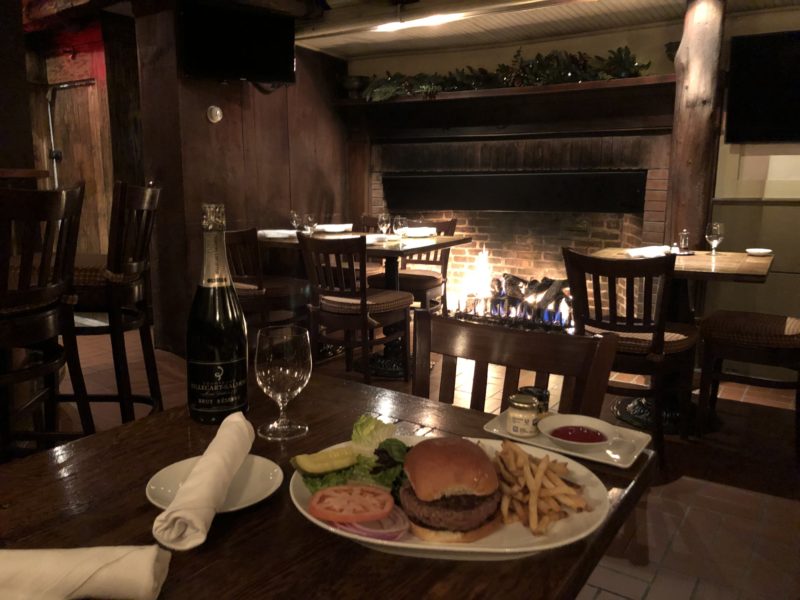

There’s this recurring nightmare I had as a child where the McDonald’s “Hamburglar,” staple of 1970s TV commercials, breaks into our house and steals all our hamburgers. It was only a dream, but for some of us omnivores, a burger-less existence really would be a nightmare.
Then again, so is the beef industry’s impact on climate change. As a whole, it makes up 14 percent of all greenhouse gas emissions — more than the entire transportation sector. A whopping 110 pounds of CO2 are released to produce just 3.5 oz. of protein (hardly a fistful).
After years of reading headlines proclaiming the horrors of bad news burgers, I’ve been well steeped in the doctrine that all cows are bad. Period. End of story.
That’s until I discovered the good cow, one whose net positive effect on climate change makes it a whole different animal. This cow is as good for reducing greenhouse gas emissions as it is for healing dead soil. It’s a cow whose own good health benefits our health. And in the race against the clock to tackle global warming, it’s a solution that not only trumps the veggie burger, but that can actually help reverse climate change.
This little heifer is not some genetically modified science project or obscure breed raised in the Andes. It’s simply a locally raised, grass-fed and pasture finished cow.
When it comes to burgers, it’s not what we eat, but how it’s raised that matters. As sustainable farmer and author, Joel Salatin says, “It’s not the cow. It’s the how.”
Even if we stopped polluting today, the greenhouse gases already in the atmosphere would continue to warm the planet. So instead of just slowing down emissions, we need to sequester what’s already out there. And the best way to do this is with healthy soil, which can absorb more CO2 than all forests and oceans combined.
Sustainably raised cows help draw carbon back into the soil, creating healthy, carbon-rich soil. A recent study of 100 percent grass fed beef showed that its net total CO2 emissions were the equivalent of minus 3.5 kilograms per kilogram of fresh meat. As “soil rancher” Steven Skrenta of Acabonac Farms says, “When you focus on the soil, grass, cows and everything else on the farm improves.”
How these cows create healthier soil is simple. With what’s called ‘rotational grazing,’ a tightly packed herd nibbles its way from pasture to pasture, just as herbivores did in the wild for thousands of years. As they rotate between plots of land, they mow back the grass and loosen up the ground to help seeds germinate and let water seep in. Moving the herd frequently allows grazed areas to rest and regenerate. The manure they leave behind acts as a fertilizer, bringing moisture and nutrients to the pasture.
When cows give up cattle feed and go vegetarian, they help save the Amazon rain forest. Traditional cattle ranching and farming soybeans for cattle feed, have destroyed 40 percent of the rain forest, compromising this vast carbon sink and pushing countless species to the brink of extinction.
When cattle feed — which consists of mostly corn, soy and other grains — is grown within the U.S., it generates huge amounts of greenhouse gases at every stage of the process. Giant mono crops on industrial farms till the soil to death, releasing buried CO2 into the atmosphere. These kinds of farms apply chemical pesticides and synthetic fertilizer. They also consume (and pollute) huge amounts of water, drying out land and making it prone to droughts, wildfires and flooding. And that’s before factoring in the fuel used in shipping.
Even the most well raised cow burps and farts methane. Grass fed cows just do it less. While methane is admittedly a potent planet warming gas, flatulence is exacerbated when livestock eat poor quality feed. The greater methane fart, as it turns out, comes from giant manure lagoons used by industrial farms. These swampy methane-burping lagoons are teaming with antibiotics and hormones that spill into nearby water supplies, killing off marine life across the country. So cows in feedlots inadvertently kill fish. How weird is that?
Grass fed cows tend to be happier. ‘Why should I care if my burger used to be happy?’ a reasonable person may wonder. Happy cows are less likely to get sick, so they need fewer antibiotics that would end up in our food.
If you’ve ever had the olfactory displeasure of visiting a factory farm (aka “cattle ranch”), you will know what unhappy cows look like. There are no John Wayne cattle drives going on here. Just miserable, bloated livestock jammed into tiny feedlots, being pumped with steroids and standing in their own feces.
Ruminants have always naturally been vegetarian. Yet in the interest of bigger cows and bigger profits, feedlot livestock are being fattened on a junk food grain that’s such an intestinal disaster that feedlots have to preemptively put antibiotics in their food rations.
Art Ludlow of Mecox Farms says it reminds him of how people used to follow a food pyramid that recommended too many empty carbs.
“Now cows are fattened with that diet?”
Just as with people, stress can also make cows sick.
“Despite their size, cows are sensitive animals,” says Skrenta, “Cowboys lassoing them, yelling at them all the time and using cattle prods stresses them out.”
He points out that at Acabonac Farms, where 65 cows graze outside year round, they’ve been in operation for six seasons and never needed a vet.
Plant based burgers are a conundrum. If you don’t eat meat for ethical reasons, a veggie burger is absolutely better than a Burger King Whopper. But if you want to be a “planetarian,” and help fight climate change, veggie burgers are only marginally better than factory farmed beef, and according to climate scientists, can actually be worse for climate change than well raised beef.
The problem, once again, is not with the cow, but the how. If the peas and potatoes in our veggie burgers came from organic local farms, that would be one thing. But industrial farms, where most of the ingredients come from, use the same detrimental farming practices that producing cattle feed employs: Monocultures tilling the soil, chemical fertilizers and pesticides, wasting water, etc. An independent life cycle analysis (LSA) found that for every Beyond Burger or Impossible Burger you eat, you’d have to eat one grass fed beef burger to offset its greenhouse gas emissions.
Sometimes I wonder how many sustainably raised cows it would take to offset my CO2 emissions. While most of us will never be as good for the planet as the grass fed cow, we can still help fight climate change… one burger at a time.
Local, Tasty Eco-Friendly Beef:
Mecox Farm:
Cuts: rib steak, porterhouse, T-bone, sirloin, chipped, flank, skirt, London broil, ground beef, beef patties, hot dogs, beef jerky.
Pork: chops, ribs, tenderloin, bacon, Italian, sage and country sausage. Cheeses, milk, local honey.
Self serve at the farm, 855 Mecox Road, Bridgehampton (down a dirt road next to the farm stand). Friday deliveries, mecoxbaydairy.com, 631-537-0335.
Acabonac Farms:
Cuts: filet mignon, sirloin, skirt, flank, strip, hanger, London broil, Delmonico, osso bucco, brisket, burger patties, ground beef, fajita strips, stew cubes, short ribs.
More of the cow: liver, oxtail, heart, bone, bone marrow, tongue, bratwurst, link sausage and hot dogs.
All are welcome to visit the farm. Kids invited to join in to help with the herd. Daily deliveries, acabonacfarms.com, 631-731-2520
 More Posts from Jenny Noble
More Posts from Jenny Noble